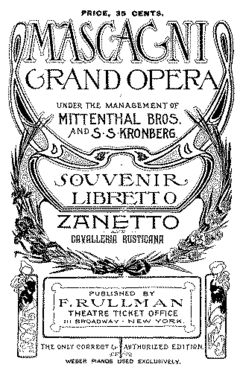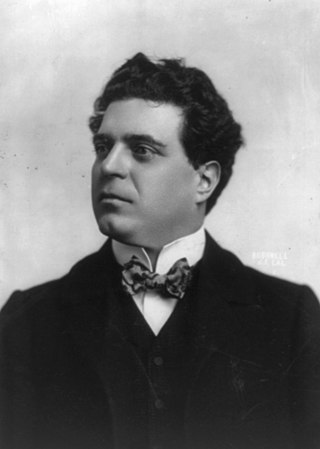
Pietro Mascagni was an Italian composer primarily known for his operas. His 1890 masterpiece Cavalleria rusticana caused one of the greatest sensations in opera history and single-handedly ushered in the Verismo movement in Italian dramatic music. While it was often held that Mascagni, like Ruggero Leoncavallo, was a "one-opera man" who could never repeat his first success, L'amico Fritz and Iris have remained in the repertoire in Europe since their premieres.
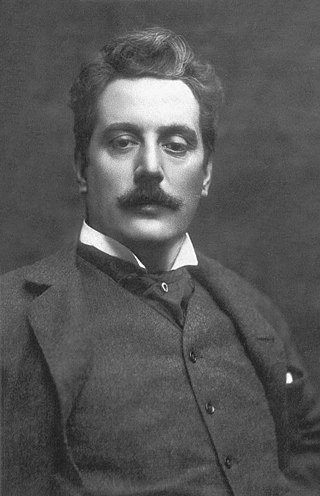
In opera, verismo was a post-Romantic operatic tradition associated with Italian composers such as Pietro Mascagni, Ruggero Leoncavallo, Umberto Giordano, Francesco Cilea and Giacomo Puccini. Verismo as an operatic genre had its origins in an Italian literary movement of the same name. This was in turn related to the international literary movement of naturalism as practised by Émile Zola and others. Like naturalism, the verismo literary movement sought to portray the world with greater realism. In so doing, Italian verismo authors such as Giovanni Verga wrote about subject matter, such as the lives of the poor, that had not generally been seen as a fit subject for literature.
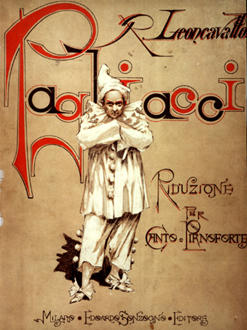
Pagliacci is an Italian opera in a prologue and two acts, with music and libretto by Ruggero Leoncavallo. The opera tells the tale of Canio, actor and leader of a commedia dell'arte theatrical company, who murders his wife Nedda and her lover Silvio on stage during a performance. Pagliacci premiered at the Teatro Dal Verme in Milan on 21 May 1892, conducted by Arturo Toscanini, with Adelina Stehle as Nedda, Fiorello Giraud as Canio, Victor Maurel as Tonio, and Mario Ancona as Silvio. Soon after its Italian premiere, the opera played in London and in New York. Pagliacci is the composer's only opera that is still widely performed.
Guglielmo Ratcliff is a tragic opera in four acts by Pietro Mascagni to an Italian libretto by Andrea Maffei, translated from the German play Wilhelm Ratcliff (1822) by Heinrich Heine. Mascagni had substantially finished the composition of Ratcliff before the success of his first opera, Cavalleria rusticana.
Parisina is a tragedia lirica, or opera, in four acts by Pietro Mascagni. Gabriele D'Annunzio wrote the Italian libretto after Byron's poem Parisina of 1816.
Silvano is a dramma marinaresco or opera in two acts by Pietro Mascagni from a libretto by Giovanni Targioni-Tozzetti, based on a novel by Alphonse Karr. It received its first performance on 25 March 1895 at La Scala, Milan. Although rarely performed today, the music is of some technical accomplishment, and when revived, Silvano has been favourably received. The barcarolle from Silvano features prominently in a montage during the Martin Scorsese film Raging Bull.

Carmen Melis was an Italian operatic soprano who had a major international career during the first four decades of the 20th century. She was known, above all, as a verismo soprano, and was one of the most interesting singing actresses of the early 20th century. She made her debut in Novara in 1905 and her career rapidly developed in her native country over the next four years. From 1909 to 1916 she performed with important opera companies in the United States; after which she was busy performing at many of Europe's most important opera houses. From 1917 until her retirement from the stage in 1935 she was particularly active at the Teatro Costanzi in Rome and at La Scala in Milan. After her singing career ended, she embarked on a second career as a voice teacher. Her most notable student was soprano Renata Tebaldi.
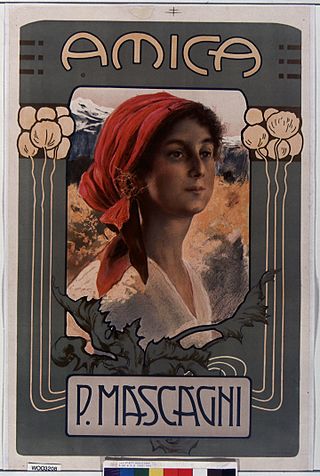
Amica is an opera in two acts by Pietro Mascagni, originally composed to a libretto by Paul Bérel. The only opera by Mascagni with a French libretto, it was an immediate success with both the audience and the critics on its opening night at the Théâtre du Casino in Monte-Carlo on 16 March 1905. Mascagni himself conducted the performance. The opera had its Italian premiere on 13 May 1905 at the Teatro Costanzi in Rome.

Lina Bruna Rasa was an Italian operatic soprano. She was particularly noted for her performances in the verismo repertoire and was a favourite of Pietro Mascagni who considered her the ideal Santuzza. Bruna Rasa created the roles of Atte in Mascagni's Nerone, Cecilia Sagredo in Franco Vittadini's La Sagredo and Saint Clare in Licinio Refice's 1926 oratorio, Trittico Francescano. She also sang the role of Tsaritsa Militrisa in the Italian premiere of Nikolai Rimsky-Korsakov's The Tale of Tsar Saltan.

Mese mariano is an opera in one act by Umberto Giordano. Its Italian libretto by Salvatore Di Giacomo was adapted from his play 'O Mese Mariano, which was in turn adapted from his novella, Senza vederlo. It premiered at the Teatro Massimo in Palermo on 17 March 1910. The opera is described as a bozzetto lirico and has a running time of 35 minutes. It tells the story of a woman who visits an orphanage to see her child. Racked with guilt at having abandoned him, she is unaware that he had died the night before.

Cavalleria rusticana is an opera in one act by Pietro Mascagni to an Italian libretto by Giovanni Targioni-Tozzetti and Guido Menasci, adapted from an 1880 short story of the same name and subsequent play by Giovanni Verga. Considered one of the classic verismo operas, it premiered on 17 May 1890 at the Teatro Costanzi in Rome. Since 1893, it has often been performed in a so-called Cav/Pag double-bill with Pagliacci by Ruggero Leoncavallo.

The Conservatorio Statale di Musica "Gioachino Rossini" is a music conservatory in Pesaro, Italy. Founded in 1869 with a legacy from the composer Gioachino Rossini, the conservatory officially opened in 1882 with 67 students and was then known as the Liceo musicale Rossini. By 2010 it had an enrollment of approximately 850 students studying for higher diplomas in singing, instrumental performance, composition, musicology, choral conducting, jazz or electronic music. The conservatory also trains music teachers for secondary schools and holds regular master classes. Its seat is the 18th century Palazzo Olivieri–Machirelli on the Piazza Oliveri in Pesaro. Amongst its past Directors are the composers Carlo Pedrotti, Pietro Mascagni, Riccardo Zandonai and Franco Alfano. Mascagni's opera Zanetto had its world premiere at the conservatory in 1896.
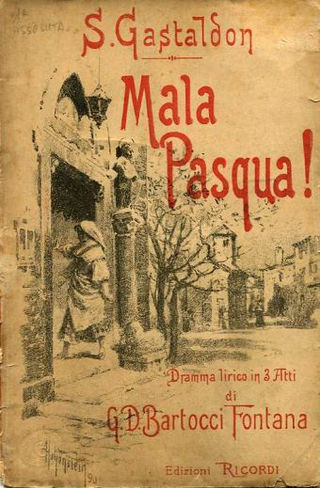
Mala Pasqua! is an opera in three acts composed by Stanislao Gastaldon to a libretto by Giovanni Domenico Bartocci-Fontana. The libretto is based on Giovanni Verga's play, Cavalleria rusticana which Verga had adapted from his short story of the same name. Mala Pasqua! premiered on 9 April 1890 at the Teatro Costanzi in Rome, six weeks before Pietro Mascagni's opera Cavalleria rusticana which was also based on Verga's play. Bartocci-Fontana's libretto adds some elements that were not in Verga's original and expands on others. The name of the Santuzza character was also changed to Carmela, but the basic plot and setting remain the same. Its title refers to the curse which Carmela places on Turiddu, the lover who had spurned her: "Mala Pasqua a te!". Following its Rome premiere, Mala Pasqua! had a few more performances in Perugia and Lisbon, but it was completely eclipsed by the phenomenal success of Mascagni's opera. After the 1891 Lisbon run it was not heard again until 2010 when it was given a semi-staged performance in Agrigento, Sicily.

Gloria is a tragic opera in three acts by Francesco Cilea with an Italian libretto by Arturo Colautti. A variation on the Romeo and Juliet story and set in 14th century Siena, the libretto is based on Victorien Sardou's 1874 play La Haine (Hatred). The opera premiered on 15 April 1907 at La Scala conducted by Arturo Toscanini with Solomiya Krushelnytska in the title role. Gloria was a failure at its premiere when it was withdrawn after two performances and fared little better in the 1932 revised version, although there have been two late 20th century revivals. It proved to be Cilea's last staged opera. In the 43 years following the premiere of Gloria he worked on two or three further operas which were never performed and continued to compose chamber and orchestral music.
This is a discography of Cavalleria rusticana, an opera by Pietro Mascagni. It premiered at the Teatro Costanzi in Rome on 17 May 17, 1890. There have been over 100 full-length recordings of Cavalleria rusticana published since it was first recorded in Germany in 1909. Mascagni himself has conducted the opera in two recordings, the best-known of which is the 1940 EMI recording made to mark the 50th anniversary of the opera's premiere. The performance by the La Scala orchestra and chorus with Lina Bruna Rasa as Santuzza and Beniamino Gigli as Turiddu also has a spoken introduction by Mascagni. Originally released as an LP, it is available on CD under several historical recording labels, including Naxos.

Amelia Felle is an Italian operatic soprano and voice teacher. Born in Bari, she has been active on the stages of Italian and European opera houses and concert halls since her debut in 1981. She holds the chair in vocal chamber music at the Conservatorio di Santa Cecilia in Rome, a position she previously held at the Conservatorio Tito Schipa in Lecce.

Mala vita is an opera in three acts composed by Umberto Giordano to a libretto by Nicola Daspuro adapted from Salvatore Di Giacomo and Goffredo Cognetti's verismo play of the same name. Giordano's first full-length opera, Mala vita premiered on 21 February 1892 at the Teatro Argentina. It was subsequently performed in Naples, Vienna, Berlin and Milan, and various Italian cities over the next two years. In 1897 a considerably re-worked and revised version under the title Il voto premiered in Milan. Within a few years, both versions had disappeared from the repertoire. Amongst its rare modern revivals was the 2002 performance at the Teatro Umberto Giordano in Foggia which was recorded live and released on the Bongiovanni label.

Elena Bianchini-Cappelli was an Italian dramatic soprano opera singer.

Regina Diaz is an opera in two acts composed by Umberto Giordano to a libretto by Giovanni Targioni-Tozzetti and Guido Menasci. It premiered on 5 March 1894 at the Teatro Mercadante in Naples. The libretto is based on Lockroy's and Edmond Badon's Un duel sous le cardinal de Richelieu, which was also the source of Donizetti's 1843 opera Maria di Rohan, although the setting for Giordano's version was moved from 17th-century Paris to 18th-century Naples. The opera was a failure at its premiere and withdrawn after the second performance. Giordano's patron and publisher, Edoardo Sonzogno, blamed the failure on the poor libretto. Giordano blamed it on Sonzogno's interference in the production.
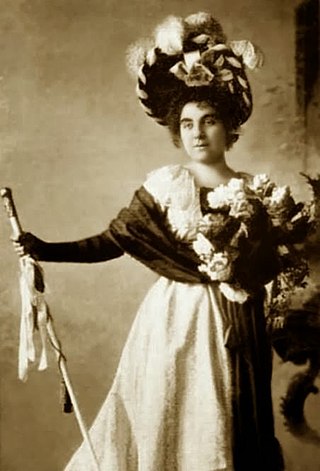
Amelia Pinto (1876–1946) was an Italian operatic soprano who first performed at the Teatro Grande in Brescia in December 1899 in La Gioconda. She developed a particular liking for Wagner, excelling in Tristan and Isolda at La Scala. She is also remembered for her interpretation of Tosca, appreciated by Puccini himself.
